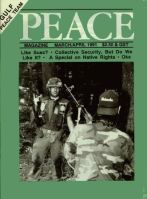
Peace Magazine Mar-Apr 1991, page 5. Some rights reserved.
Search for other articles by Barry Stevens here
Search for other articles by Mac Scott here
Search for other articles by Saul Chernos here
By Barry Stevens
NEW YORK CITY-A two week Conference to discuss amending the 1963 Partial Test Ban Treaty (PTBT) ended here January 18th without agreement on expanding the Treaty to a comprehensive ban on all nuclear testing. As expected, the U.S. and the U.K. opposed the amendment. Nevertheless a resolution was passed mandating the President of the Conference to conduct consultations with a vision to facilitate progress towards a comprehensive test ban treaty (CTBT) and another conference will be held, most likely in 1993.
The Amendment Conference was the brainchild of Parliamentarians for Global Action (PGA), an organization of legislators from all over the world. A clause in the PTBT allowed the signatories to call an amendment conference and request the nuclear testing powers to change the treaty to a CTBT and this is PGA's ultimate aim.
The Conference opened on January 7th in the U.N. General Assembly Hall with 95 of the parties in attendance. Ali Alatas, the Foreign Minister of Indonesia, and President of the Conference, said that "what is now needed.. is the political determination to move ahead and I believe governments should no more seek refuge in arguments long since shown to be untenable or irrelevant."
Mexico proposed a system of sanctions for violators of a CTBT. The U.S. and U.K., however, reiterated their opposition to a CTBT at present, and the U.S. refused to attend or pay for any future sessions of the Conference.
PGA, whose International President is Canadian former MP Warren Allmand, announced its intention to follow the Conference with a new campaign to hold a world-wide parliamentary referendum on nuclear testing.
By Macdonald Scott
HAYWARD CA- Susan B. Rodriguez was arrested last April after destroying computers at Physics International-a company that designs computer systems for nuclear war-in a "Plowshares" style action. Using a small sledgehammer she disabled many of the company's most crucial computers, until finally stopped by employees.
Physics International uses information gained from the Nevada Test Site to build laboratory devices which enable them to aid the U.S. government in planning an effective first strike strategy. Susan was especially appalled to discover that the company had been acting under total secrecy, completely unaccountable to the public: "Even the government facilities are accountable to the public. This has basically been hidden for all these years."[SF Weekly, Vol IX, No.36]
Susan was charged with property damage (the company claims she smashed 55 computers causing 525,000 dollars of damage), and burglary (breaking and entering with the intent to commit a felony). She maintains that she is not guilty of a crime, but was acting to save lives.
Rodriguez has been an activist for over 20 years as a feminist, in support of Gay rights, in solidarity with the homeless, in the peace movement.
By Saul Chernos
THE GULF-Canadian and American peacemakers visited Iraq in November for one week. Sponsored by the North American and General Conferences of the Mennonite Church, the Church of the Brethren and Brethren in Christ, the visitors met with Iraqi citizens and government officials.
Professor H. Huebner, of Winnipeg, joined Ron Rempel of Waterloo, Hedy Sawartzky of Vineland, Ontario, and nine Americans on the mission, which sought the release of hostages and avoidance of war.
Peacemakers visited hospitals, bringing antibiotics and pediatric supplies to help ease a shortage of medicines. At a Baghdad school, pupils put on a display in support of Iraqi rulers.
"There was a lot of animosity and anger shown against Americans," said Huebner. But he explained that there is as much hate propaganda against Bush as there is in North America towards Saddam Hussein. "We both have very clever ways of making leaders of our enemies appear evil." Describing Iraq as a police state, he said peacemakers were constantly escorted by government officials.
On September 16, a convoy of landcruisers and ambulances left Amman, Jordan, for Baghdad. The Gulf Peace Team, having been evacuated from its peace camp on the Iraqi/Saudi border, undertook this trip to bring medical supplies into Iraq. Although the U.N. resolution does not include medical supplies in the embargo, in practice, no deliveries have been completed.
The Peace Team announced their travel plans, requesting that the highway not be bombed. They also released an open letter to Secretary General Perez de Cuellar in which they ask that the embargo of food be liberalized so that Iraqi children may not starve.
OTTAWA-The annual arms bazaar has been postponed until late September. The organizers explain that this is because they are too busy on "peace restoration efforts."

Peace Magazine Mar-Apr 1991, page 5. Some rights reserved.
Search for other articles by Barry Stevens here
Search for other articles by Mac Scott here
Search for other articles by Saul Chernos here